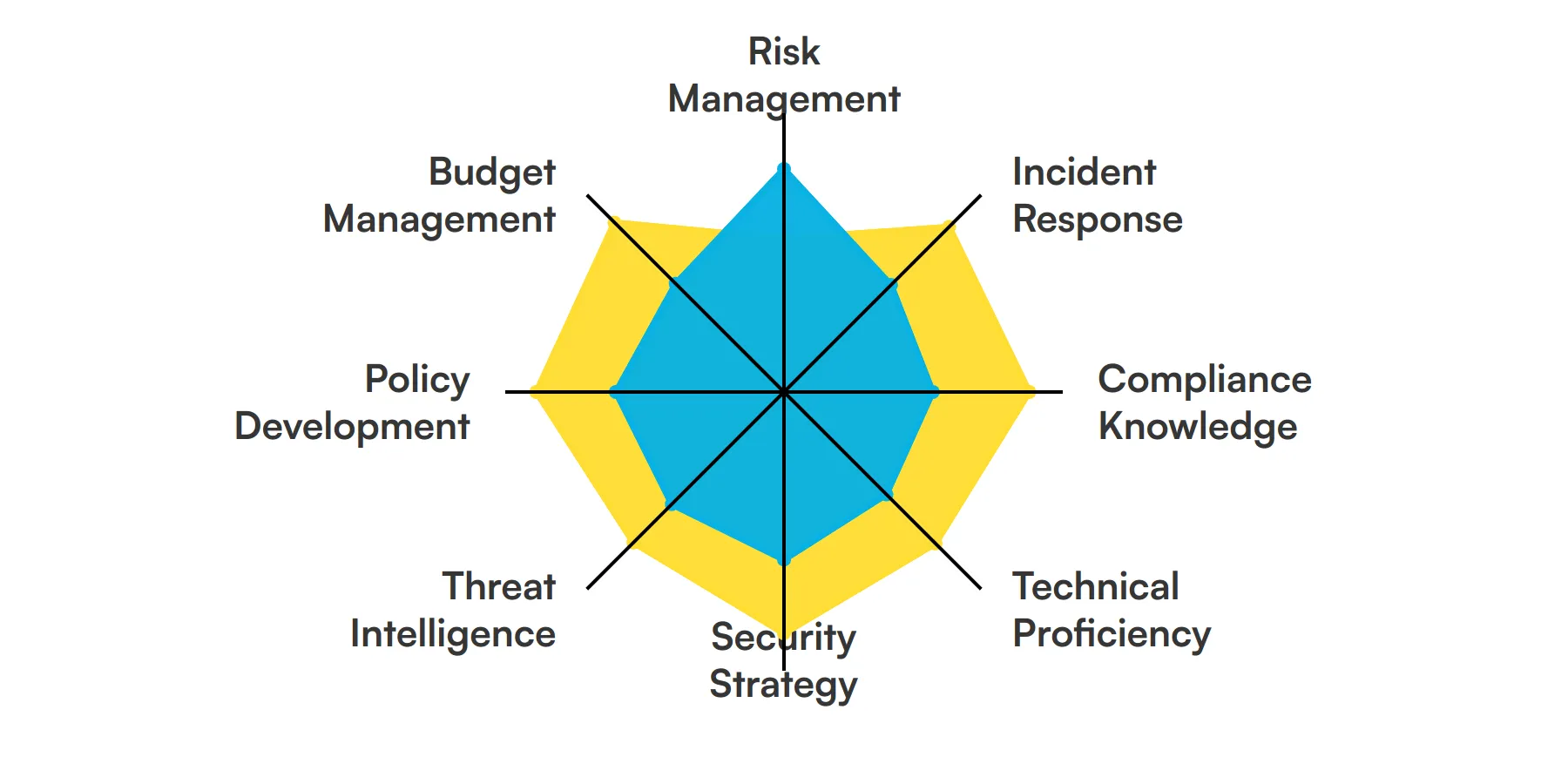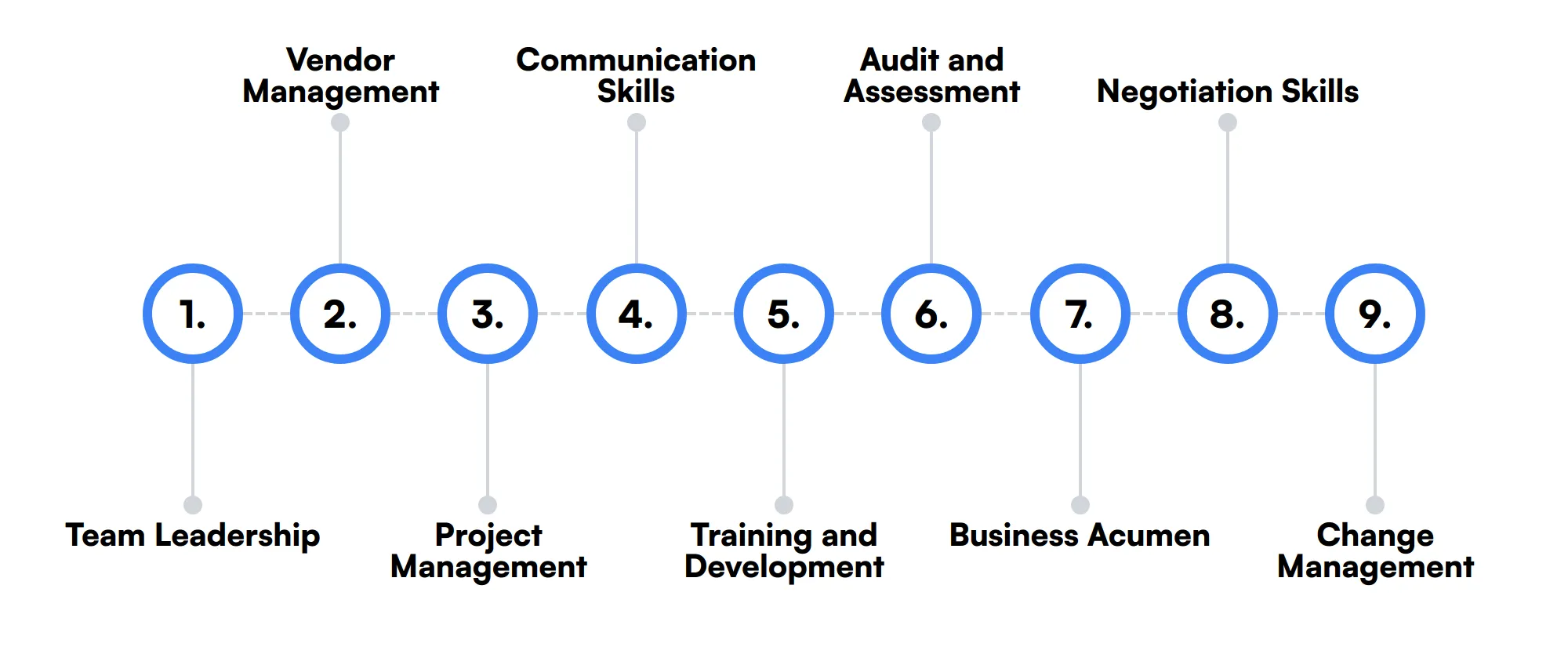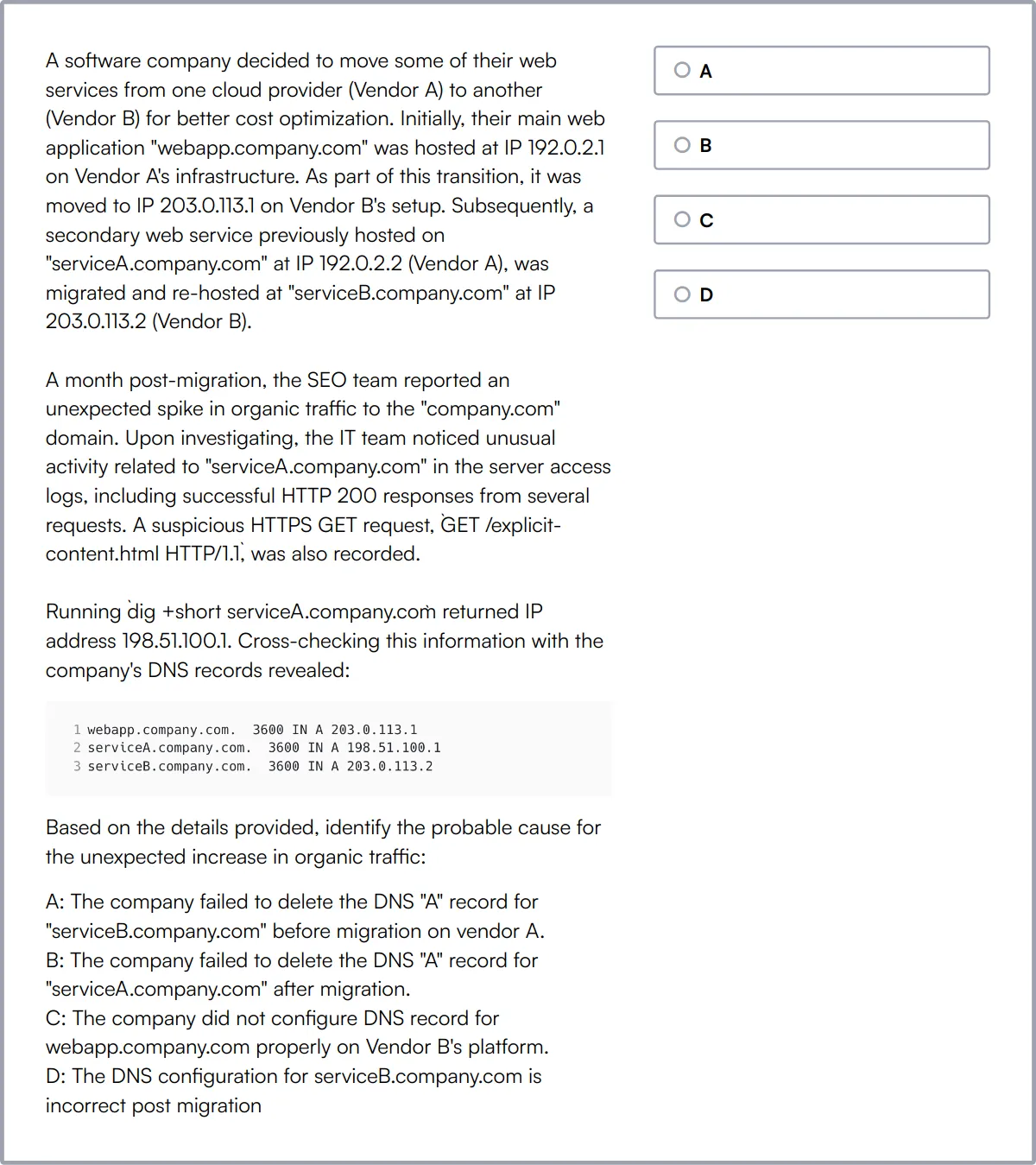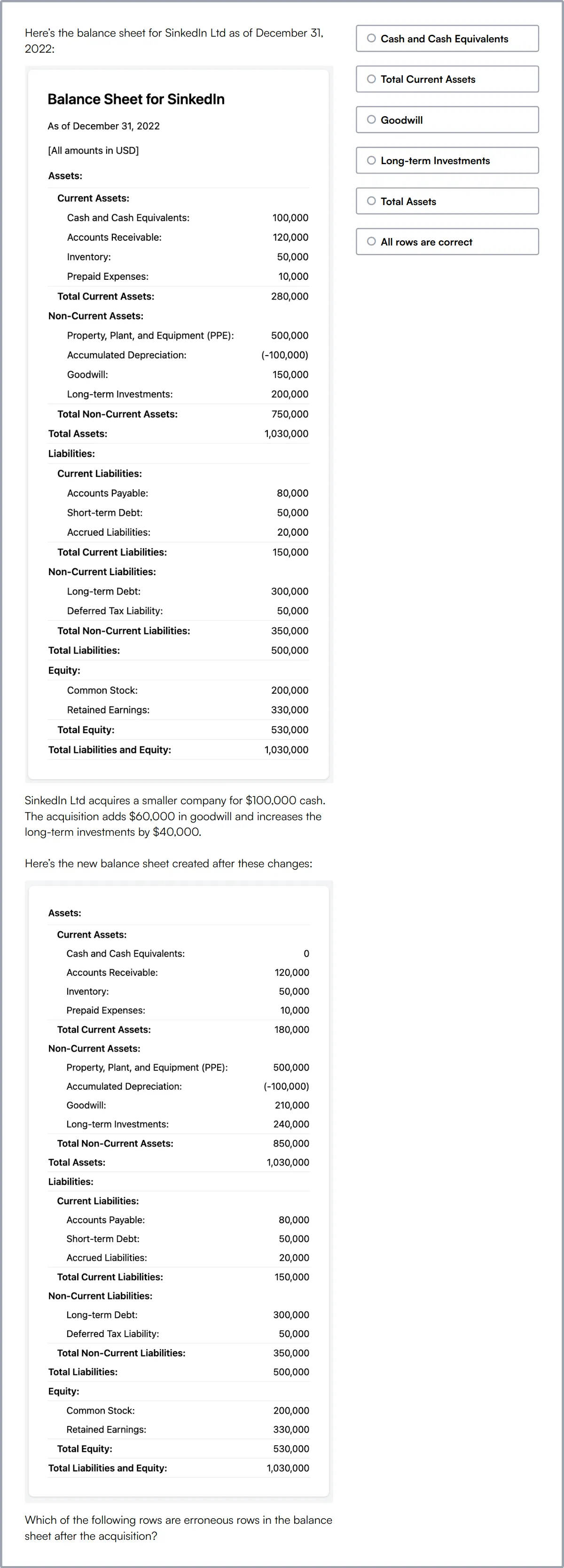The Chief Information Security Officer (CISO) plays a critical role in safeguarding an organization's information assets. They are responsible for developing and implementing comprehensive security strategies to protect sensitive data from cyber threats.
Key skills for a CISO include a deep understanding of cybersecurity frameworks, risk management, and incident response. Additionally, strong leadership and communication skills are essential to effectively manage the security team and collaborate with other departments.
Candidates can write these abilities in their resumes, but you can’t verify them without on-the-job Chief Information Security Officer skill tests.
In this post, we will explore 8 essential Chief Information Security Officer skills, 9 secondary skills and how to assess them so you can make informed hiring decisions.
Table of contents
8 fundamental Chief Information Security Officer skills and traits
The best skills for Chief Information Security Officers include Risk Management, Incident Response, Compliance Knowledge, Technical Proficiency, Security Strategy, Threat Intelligence, Policy Development and Budget Management.
Let’s dive into the details by examining the 8 essential skills of a Chief Information Security Officer.

Risk Management
A Chief Information Security Officer (CISO) must excel in identifying, evaluating, and mitigating risks to ensure organizational data security. This skill involves understanding potential security threats and implementing strategic solutions to prevent breaches and minimize impact.
For more insights, check out our guide to writing a Risk Analyst Job Description.
Incident Response
The ability to quickly and effectively respond to security incidents is crucial for a CISO. This skill requires developing and executing incident response protocols, which helps minimize damage and restore systems to normal operations swiftly.
Compliance Knowledge
Understanding and adhering to relevant laws, regulations, and standards is key for a CISO. This skill ensures that the organization meets all security obligations, thus avoiding legal repercussions and maintaining trust with stakeholders.
Technical Proficiency
A CISO must have a deep understanding of information security technologies and infrastructure. This includes knowledge of network security, encryption, and cybersecurity software, which are instrumental in protecting an organization's digital assets.
Security Strategy
Developing and implementing a comprehensive security strategy is a fundamental task for a CISO. This involves aligning security initiatives with business objectives to enhance protection while supporting organizational growth.
Threat Intelligence
Staying ahead of emerging security threats by gathering and analyzing intelligence is a key responsibility for a CISO. This proactive approach helps in anticipating potential vulnerabilities and crafting defenses against them.
Policy Development
Creating and maintaining security policies that align with organizational goals and compliance requirements is essential. A CISO uses this skill to set guidelines that govern employee behavior and security practices.
Budget Management
A CISO must effectively manage the budget for security operations and investments. This skill involves allocating resources wisely to maximize security posture without overspending, ensuring financial efficiency.
9 secondary Chief Information Security Officer skills and traits
The best skills for Chief Information Security Officers include Team Leadership, Vendor Management, Project Management, Communication Skills, Training and Development, Audit and Assessment, Business Acumen, Negotiation Skills and Change Management.
Let’s dive into the details by examining the 9 secondary skills of a Chief Information Security Officer.

Team Leadership
Leading and managing a team of security professionals is important for a CISO to ensure that security measures are implemented effectively and staff remain motivated and informed.
Vendor Management
A CISO often needs to oversee relationships with security solution vendors, ensuring that the services and products delivered meet the organization's security needs and standards.
Project Management
The ability to manage projects, from inception to completion, ensures that security initiatives are executed on time and within budget, which is a valuable skill for a CISO.
Communication Skills
Effective communication, both written and verbal, is necessary for a CISO to articulate security risks and strategies to stakeholders, including non-technical audiences.
Training and Development
Developing training programs for staff on security protocols and best practices helps a CISO ensure that the team is well-prepared to handle security challenges.
Audit and Assessment
Conducting regular security audits and assessments allows a CISO to identify vulnerabilities and compliance issues, which is crucial for maintaining the security integrity of the organization.
Business Acumen
Understanding the business environment and its relation to security can help a CISO make informed decisions that align security measures with business objectives.
Negotiation Skills
Negotiating with stakeholders and vendors to achieve favorable terms for security initiatives and purchases is another useful skill for a CISO.
Change Management
The ability to manage organizational change, especially related to implementing new security policies and technologies, is important for a CISO to maintain stability and security.
How to assess Chief Information Security Officer skills and traits
Assessing the skills and traits of a Chief Information Security Officer (CISO) can be a challenging task. A CISO needs to have a blend of technical expertise, strategic thinking, and leadership abilities. It's not just about knowing the latest security technologies but also about managing risks, responding to incidents, and ensuring compliance with regulations.
Traditional resumes and interviews might not give you a complete picture of a candidate's capabilities. This is where skills-based assessments come into play. By using targeted assessments, you can evaluate a candidate's proficiency in key areas such as risk management, incident response, compliance knowledge, and more. Adaface on-the-job skill tests can help you achieve a 2x improved quality of hires and an 85% reduction in screening time.
When assessing a CISO, it's important to consider their technical proficiency, ability to develop and implement security strategies, and their knowledge of threat intelligence. Additionally, their skills in policy development and budget management are crucial for ensuring the organization's security posture. By focusing on these areas, you can ensure that you are hiring a CISO who is well-equipped to protect your organization's information assets.
Let’s look at how to assess Chief Information Security Officer skills with these 4 talent assessments.
GDPR Online Test
Our GDPR Online Test evaluates candidates on their understanding of GDPR regulations and best practices for data protection and privacy. This test is important for assessing a candidate's ability to manage data privacy and ensure compliance with GDPR standards.
The test covers data privacy, data protection, data breach management, and consent management. It also evaluates the candidate's knowledge of data subject rights, data transfer, and the roles of data controllers and data processors.
Candidates who perform well demonstrate a strong understanding of GDPR compliance policies and the ability to identify and mitigate data protection risks.
Penetration Testing Test
Our Penetration Testing Test evaluates a candidate's skills in penetration testing, network security, and vulnerability assessment. This test is crucial for identifying candidates who can effectively secure systems and applications.
The test assesses knowledge in penetration testing, network security, vulnerability assessment, and web application security. It also evaluates the candidate's ability to identify vulnerabilities and provide security recommendations.
High-scoring candidates show proficiency in ethical hacking and the ability to improve the security posture of systems and applications.
Cyber Security Assessment Test
Our Cyber Security Assessment Test evaluates candidates on their knowledge of cybersecurity basics, including operating systems, computer networks, and cloud concepts. This test is essential for assessing a candidate's ability to detect and mitigate security risks.
The test covers network security, cybersecurity attacks, cryptography, web security, email security, malware, data security, and cybersecurity defenses. It also assesses the candidate's ability to conduct risk assessments and network tests.
Successful candidates demonstrate a strong understanding of cybersecurity principles and the ability to set up defenses against various cyber threats.

Financial Accounting Online Test
Our Financial Accounting Test evaluates a candidate's knowledge and skills related to financial statements, accounting principles, and financial analysis. This test is important for assessing a candidate's ability to interpret and analyze financial data.
The test covers financial statements, accounting principles, double-entry bookkeeping, assets and liabilities, income and expense recognition, and financial ratios. It also evaluates the candidate's ability to perform financial analysis and communicate financial information effectively.
Candidates who perform well demonstrate a strong understanding of accounting standards and the ability to apply financial concepts in real-world scenarios.

Summary: The 8 key Chief Information Security Officer skills and how to test for them
| Chief Information Security Officer skill | How to assess them |
|---|---|
| 1. Risk Management | Evaluate the ability to identify, assess, and mitigate security risks. |
| 2. Incident Response | Assess the capability to handle and resolve security incidents promptly. |
| 3. Compliance Knowledge | Check understanding of regulatory requirements and adherence to them. |
| 4. Technical Proficiency | Gauge expertise in security technologies and tools. |
| 5. Security Strategy | Determine the skill in developing and implementing security strategies. |
| 6. Threat Intelligence | Evaluate the ability to analyze and respond to emerging threats. |
| 7. Policy Development | Assess the capability to create and enforce security policies. |
| 8. Budget Management | Check proficiency in allocating and managing security budgets. |
Cyber Security Assessment Test
Chief Information Security Officer skills FAQs
What are the key skills required for a Chief Information Security Officer (CISO)?
A CISO needs skills in risk management, incident response, compliance knowledge, technical proficiency, security strategy, threat intelligence, policy development, budget management, team leadership, vendor management, project management, communication, training and development, audit and assessment, business acumen, negotiation, and change management.
How can recruiters assess a candidate's risk management skills for a CISO role?
Recruiters can assess risk management skills by asking candidates to describe past experiences where they identified, evaluated, and mitigated risks. They can also request examples of risk assessments and mitigation plans the candidate has developed.
What questions should be asked to evaluate a CISO's incident response capabilities?
Ask candidates to detail their experience with incident response, including specific incidents they have managed. Inquire about their approach to incident detection, containment, eradication, and recovery.
Why is compliance knowledge important for a CISO, and how can it be assessed?
Compliance knowledge ensures that the organization adheres to legal and regulatory requirements. Assess this by asking about the candidate's familiarity with relevant laws and regulations, and their experience in implementing compliance programs.
How can technical proficiency be evaluated in a CISO candidate?
Evaluate technical proficiency by discussing the candidate's experience with various security technologies, their understanding of network and system security, and their ability to stay updated with the latest security trends and threats.
What role does business acumen play in a CISO's responsibilities?
Business acumen helps a CISO align security strategies with business goals. Assess this by asking how the candidate has previously balanced security needs with business objectives and their experience in communicating security's value to stakeholders.
How important are communication skills for a CISO, and how can they be assessed?
Communication skills are crucial for conveying security policies and incidents to both technical and non-technical stakeholders. Assess this by evaluating the candidate's ability to explain complex security concepts in simple terms and their experience in presenting to executive teams.
What methods can be used to assess a CISO candidate's team leadership abilities?
Assess team leadership by asking about the candidate's experience in managing security teams, their approach to mentoring and developing team members, and examples of how they have successfully led teams through challenging security projects.

40 min skill tests.
No trick questions.
Accurate shortlisting.
We make it easy for you to find the best candidates in your pipeline with a 40 min skills test.
Try for freeRelated posts
Free resources



